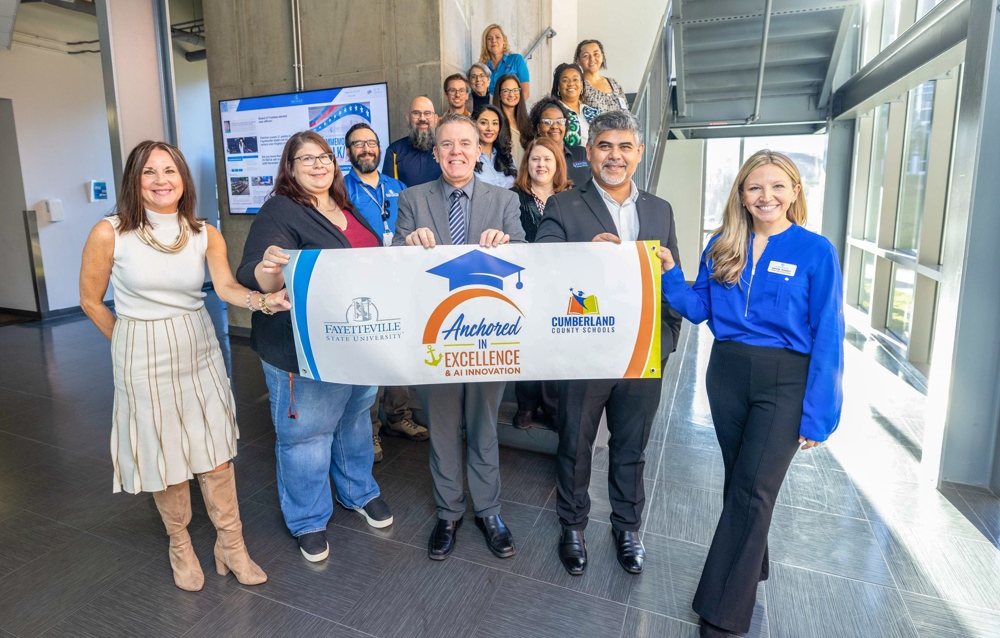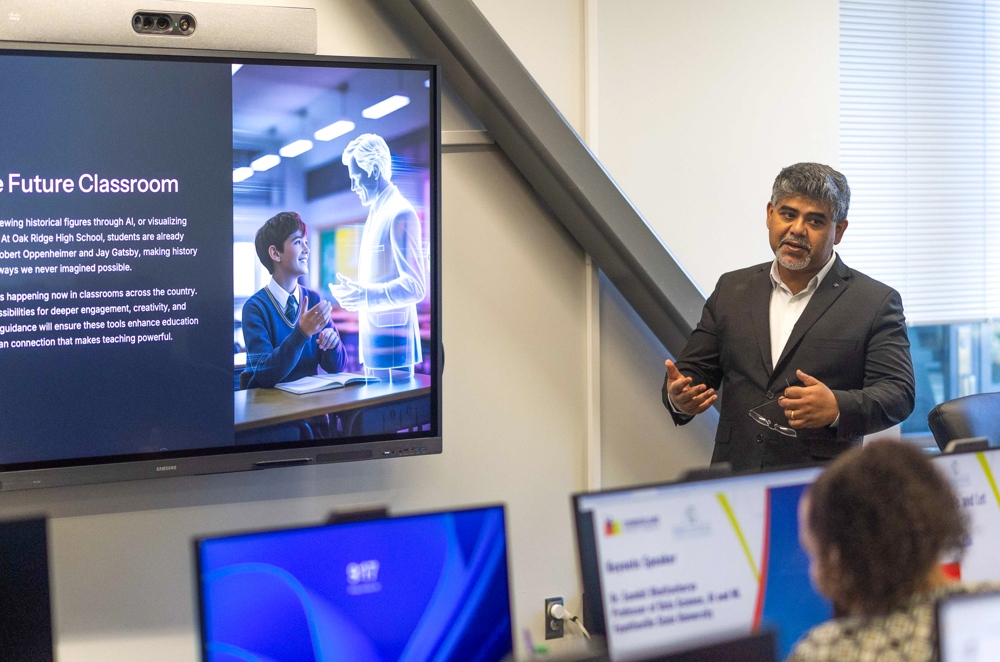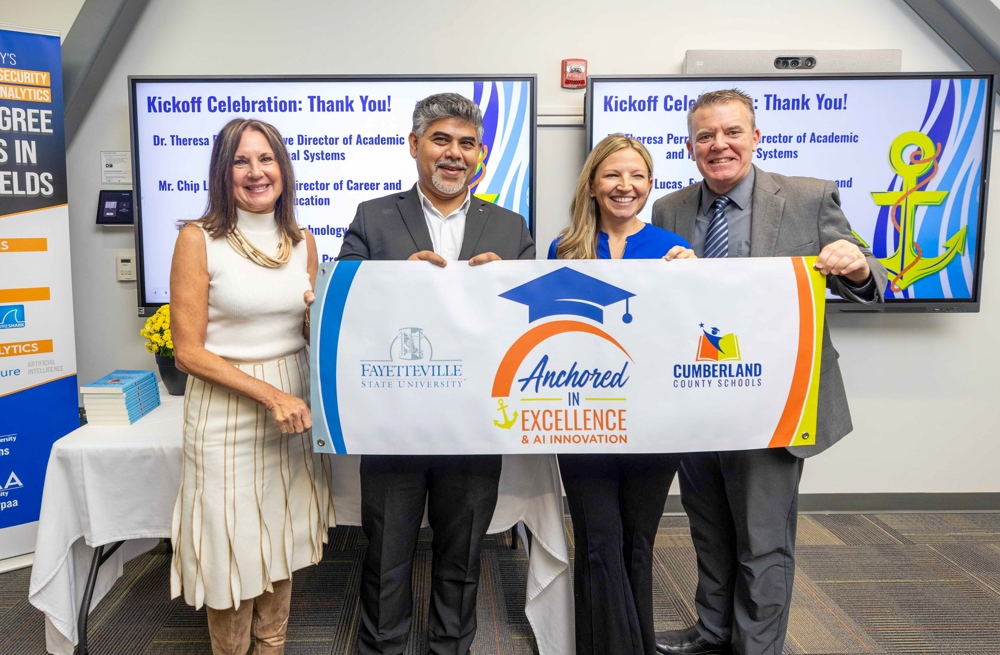Is Fayetteville State Laying the Foundation for North Carolina’s AI Future in Education?
A partnership between FSU, AI Learning Central, and Cumberland County Schools is redefining how North Carolina prepares educators and students for the age of artificial intelligence.

FAYETTEVILLE, N.C. – Artificial intelligence is transforming every corner of the economy, and education is no exception. At Fayetteville State University, that transformation isn’t measured by what AI can do but by what kind of thinkers it can help us become.
That vision came to life inside FSU’s Science and Technology Building on Oct. 24, where local educators and administrators gathered for the launch of the AI Literacy Bootcamp, a first-of-its-kind partnership between the university, AI Learning Central, and Cumberland County Schools to advance AI literacy, ethical leadership, and workforce readiness across North Carolina.
The launch comes at a time when North Carolina is working to catch up in the race toward an AI-ready workforce. A July 2025 report ranked the state No. 28 in national AI readiness. While job growth (No. 10) and innovation funding (No. 13) are strong, challenges persist in computer science education (No. 24) and access to digital infrastructure (No. 39). The bottom line is that technology is evolving faster than the systems built to teach it.
In response, Governor Josh Stein signed Executive Order No. 24: Advancing Trustworthy Artificial Intelligence That Benefits All North Carolinians, calling on agencies and educators to expand training and ensure equitable access to these emerging technologies.
For FSU, this statewide call to action aligns naturally with its mission as a regional driver for innovation and public service, making the university a logical leader in supporting the state’s growing need for AI-focused education.
“If we want North Carolina to compete in the age of AI, we have to start with the people who shape how we learn,” said Sambit Bhattacharya, Ph.D., professor of Computer Science and director of the Intelligent Systems Laboratory. “Teachers are the bridge between innovation and opportunity. By giving them the tools and confidence to use AI responsibly, we’re preparing an entire generation to lead with knowledge, not fear.”

A Collaborative Blueprint for the AI Workforce: Turning Vision into Action
Funded through Bhattacharya’s Office of Naval Research grant, “Data and AI Literacy for National Security,” the bootcamp translates cutting-edge research into practical classroom applications. By bridging university expertise, industry insights, and K-12 creativity, the initiative demonstrates how higher education and local districts can work together to make AI education both practical and human-centered.
Central to this effort is a three-part learning series co-designed by Bhattacharya and Ashlee Russell, founder and CEO of AI Learning Central. The program invites 10 district educators and administrators to explore how AI can enrich classroom learning through creativity, collaboration, and ethical leadership.
The inaugural session in October introduced participants to AI literacy and design thinking through hands-on builder's lab activities, turning abstract concepts into practical teaching tools. Building on this foundation, the following sessions on Nov. 7 and Nov. 21 will emphasize leadership in ethics, classroom application, and project-based learning aligned with the Presidential AI Challenge.
“This isn’t just professional development—it’s professional empowerment,” said Russell. “Fayetteville State’s expertise builds a bridge between advanced AI research and the classroom creativity that prepares students for tomorrow’s workforce.”

Research with Purpose: Advancing AI Innovation Beyond the Classroom
Bhattacharya’s leadership in AI extends far beyond this collaboration. He also serves as a funded collaborator with the Laboratory for Analytic Sciences at North Carolina State University, where he develops tools to detect rare objects in video for national security applications. He has been honored with the University of North Carolina Board of Governors Award for Teaching Excellence and NASA's Space Tech Catalyst Prize, and has authored more than 60 peer-reviewed publications on AI and related technical topics.
Through FSU’s Intelligent Systems Laboratory, Bhattacharya leads robotics and ethical AI research while mentoring students. This commitment, coupled with the partnership with Cumberland County Schools, further strengthens Fayetteville State’s regional role in AI education and innovation, illustrating the university’s dedication to bridging research and real-world impact.
“We’re living in a transformative era,” Bhattacharya said during his keynote. “AI isn’t just a tool—it’s reshaping how we think, create, and solve problems. But it will always need human guidance, human context, and human purpose.”
Russell, who has trained educators nationwide through AI Learning Central, complements Bhattacharya’s expertise by developing instructional frameworks to make AI accessible for all grade levels and disciplines. By working together, their approaches ensure that educators can apply AI tools to enhance, rather than replace, critical thinking in the classroom.
That mission aligns with the groundwork laid by Theresa Perry, Ed.D., executive director of Academic and Instructional Systems at CCS, and Chip Lucas, executive director of Career and Technical Education at CCS. Under Perry’s leadership, the district became one of the first in the state to establish “A Guide to Responsible AI Implementation” and launch a year-long “AI Educators Cohort,” which built teacher capacity and laid the foundation for this partnership with FSU.
Meanwhile, Lucas has expanded AI integration through the district’s SparkLab at Douglas Byrd High School and new high-school-level AI courses that strengthen North Carolina’s career and technical education pathways. Together, Perry and Lucas have positioned CCS as a statewide model for K-12 AI implementation, bridging innovation from classroom to career.
Looking ahead, as North Carolina expands its digital infrastructure and education capacity, Fayetteville State, AI Learning Central, and Cumberland County Schools are offering a replicable model for how local partnerships can drive statewide progress. The AI Literacy Bootcamp marks just the beginning; a framework for teacher training that aligns education with workforce needs and builds public trust in emerging technology.
By investing in educators today, the university and its partners are helping North Carolina prepare for an AI future guided by creativity, ethics, and human ingenuity.
